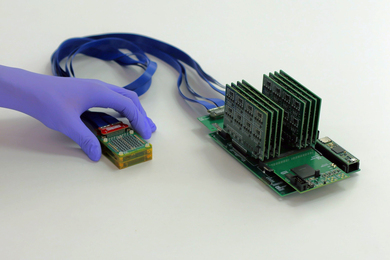When more than 150 students from 25 area high schools got a first-hand look at the fast-growing world of biotechnology at a three-day program arranged by the Whitehead Institute for Biomedical Research (Tech Talk, Feb. 28), the Whitehead Bulletin asked them how they liked the program.
The responses, the Bulletin reported, were overwhelmingly enthusiastic, along the lines of:
"I usually hate lectures, but I liked these very much. I thought they were too short. I got a little sad at the end of the last lecture when I thought, `The lectures are all over.'" (Thu Hang Nguyen, Charlestown High School).
"I didn't come close to not liking any of the [lab] demos" (Devin Underwood, Cambridge Rindge and Latin School).
"[The tour] was fantastic: a hands-on approach to seeing a biotech pharmaceutical firm's work in progress" (Lindsay Rosenfield, Stoughton High School).
"The panel discussion was my favorite part of this program. It was informative in that it had a lot of significance in the decisions I will soon be facing. The session was just the right length and the panel members were informative and enthusiastic" (Elena Ghanotakis, Arlington High School).
"I enjoyed meeting the postdocs and grad students [at lunch].They answered [our questions] with much enthusiasm and were informative and gave us tips and advice. The food was very good. I enjoyed everything." (Alfa Tiruneh, Boston Latin School).
"The entire program was just right. The different sessions were excellent. They gave us a broad sense of the biotechnology field." (Xing Ling Li, Boston Latin School).
---------------
It's been said you don't have to be a rocket scientist to be an actor.
But apparently it's not a drawback, either.
Stephen W. Altes received three degrees from MIT, became a rocket scientist and did consulting work for the National Aeronautics and Space Administration.
But he gave it all up about a year ago, according to The Washington Post, for a career in acting and modeling. Twice he has been a stand-in for actor Brad Pitt, first in 12 Monkeys and now in a movie being filmed in New York, The Devil's Own.
Mr. Altes, 33, lives in Centreville, VA. He received the SB and SM in aeronautics and astronautics in 1984 and 1986, and another SM in 1986, in the Technology and Policy Program.
His got into acting, he told the Post, after he agreed to pose with a neighbor for her modeling portfolio and her agency picked him up. His first role was as a German terrorist in Die Hard With a Vengeance.
"The 6-foot-tall blond quit his day job," the Post said, "after his boss told him, `You're going to have to choose between technology and government or Hollywood and show business.'"
---------------
Eve Sullivan, senior editorial assistant in the Laboratory for Nuclear Science, has been invited to present "Parents Forum: A New Resource for Parents and Professionals" at the International Family Therapy Association 8th World Congress in Athens, Greece, July 4-10.
Parents Forum, founded in 1991 by Ms. Sullivan out of some difficult family experiences, has grown over the last several years, she said, thanks in part to encouragement and support from within MIT, including an Entrepreneurs Club "social venturing award" in 1993. Recently the program was given office and meeting space at Cambridge Family and Children's Service, 929 Massachusetts Ave., Cambridge, where evening parent workshops are being offered in April and May.
Clips:
An editorial writer for the Austin (TX) American-Statesman--without question, a parent--has taken an amusing look at artificial intelligence:
"Geniuses at MIT are on the verge of creating a robot with the intelligence of a two-year-old child, according to a report by the Knight-Ridder News Service.
"Didn't anyone in that seat of learning bother to ask why in the world anyone would want to build a two-year-old. Doesn't the world have enough of them already? Was there no one in the department--in the administration, somewhere on campus--who had spent time with an actual two-year-old and could call off this project or cut the funding?
"Does it take a genius to create a robot with the one-word vocabularly of `NO'? Does it take computer experts and scientists to create a machine that emanates an incessant high-pitched whine? That can toss food across a room? Pull the fur off a pet? Break the heirlooms?
"It is confusing to think that anyone, much less someone with the smarts on display at MIT, would bother to create a robot with the intelligence of a two-year-old. At least build an android that has passed through the terrible twos."
---------------
The Chronicle of Higher Education (March 15), taking note of the weak job market in higher education, pointed to efforts at MIT and elsewhere to make its science doctoral candidates aware of career options outside academe.
It's not easy, however, Robert K. Weatherall, director of the Office of Career Services and Preprofessional Advising, told the newspaper, explaining:
"Young men and women who have gone all through college knowing nothing but academic mentors think that the rest of the world is cheap and tawdry and motivated by economic profit."
According to the Chronicle, the Department of Physics is using guest speakers and internships to help students explore alternate careers. For the past four years, the newspaper said, the department has scheduled seminars featuring physicists who are management consultants, patent lawyers and business owners.
It also asked Dr. Peter A. Wolff, professor emeritus of physics, to find industrial sponsors for an internship program that begins this summer. So far, the newspaper reports, he has lined up 18 companies.
Among other advantages, he told the Chronicle, an internship gives graduate students valuable contacts. "Students used to rely on their faculty members to get them jobs," he said. "Now faculty are kind of at a loss. What's out there is changing exceedingly fast."
Quotes:
"One crucial aspect is the absence of people from [the black] community who are in a position to affect the policy of the [Department of Social Services]. There is an attitude that says, `We know what's best.'"--Melvin H. King, adjunct professor of urban studies and planning and director of the Community Fellows Program, in a Boston Herald story on complaints by a black community group that a disproportionate number of black children are removed from their homes, and that the DSS has not hired enough black workers to serve its clientele.
"The candidates are promising what no president can deliver."--Dr. Robert M. Solow, Institute Professor Emeritus and Nobel laureate in economics, in a New York Times article on the unlikelihood that any economic remedy can return the country to booming growth.





